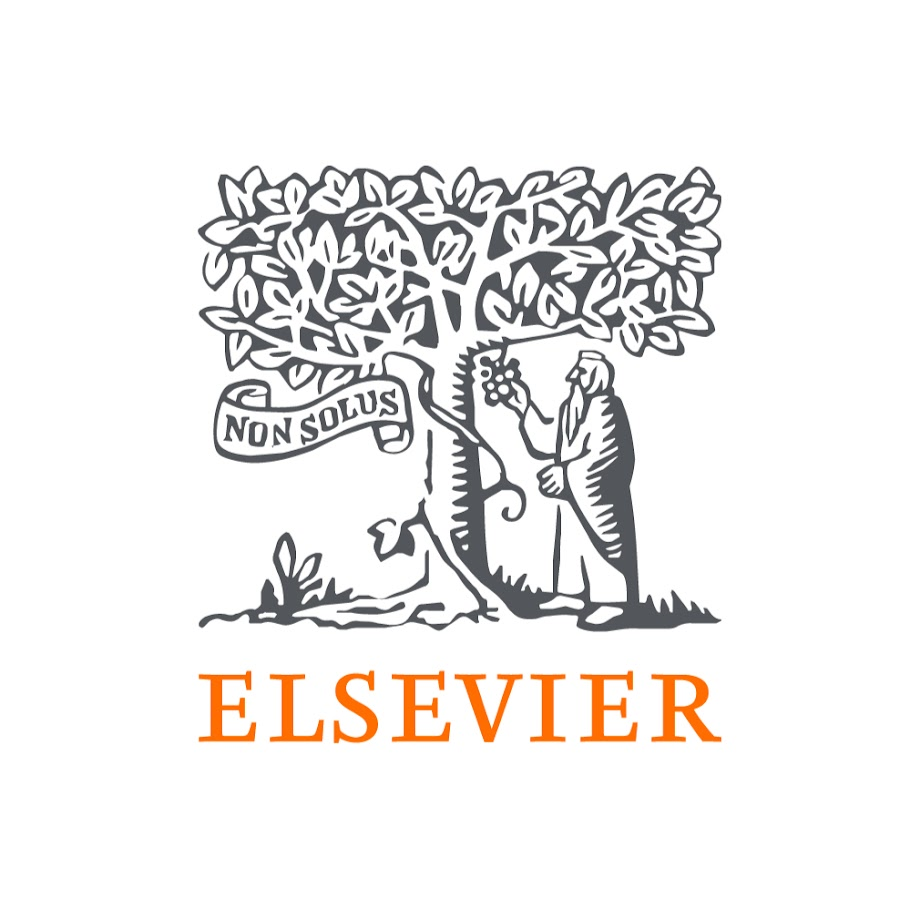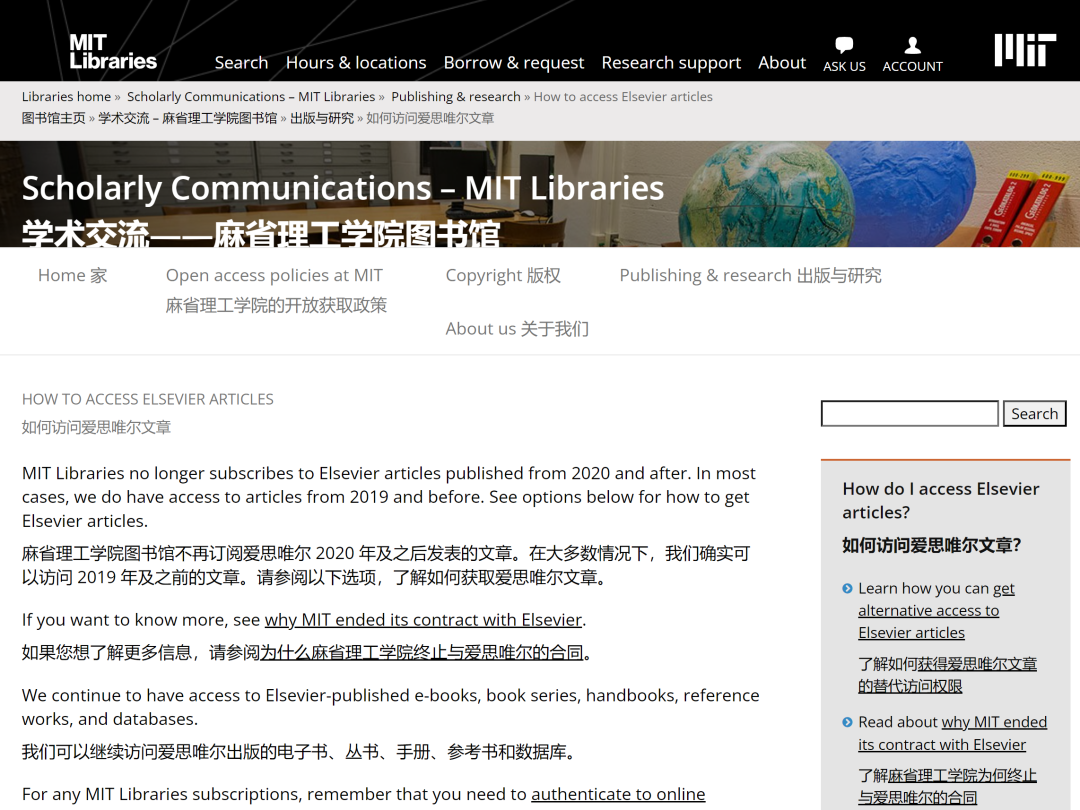
Following the breakdown of negotiations with Elsevier in 2020, MIT has taken a new route that is not tied to large journal subscriptions, saving $2 million per year. For universities, journal subscription fees have always been a huge expense. Especially the cost of subscribing to journals from the world’s top publishing groups like Elsevier.

However, while providing convenience to authors and readers, Elsevier’s subscription fees have always been high, inevitably placing a heavy financial burden on universities and other scientific research institutions. In addition, Elsevier’s publishing nature of mainly closed journals is not in line with the concept of “fair and open access to knowledge” advocated by the scientific community. Therefore, in recent years, there have been many cases of boycotting or even giving up subscriptions to Elsevier journals.
In 2020, negotiations between the Massachusetts Institute of Technology (MIT) and Elsevier broke down, and Elsevier journal contracts were canceled for all 675 journals. The attitude was very decisive.
Four years have passed, how is MIT doing without Elsevier? Judging from a recent article published by the school’s library: things seem to be going well.
MIT Libraries estimates it has saved more than 80 percent of its original expenditures each year since canceling its Elsevier journal contract, the library said. This move saves MIT approximately $2 million annually. And the library offers alternative access methods that can fulfill most article requests in minutes.
Moreover, this matter is progressing relatively smoothly, and there is relatively little resistance from researchers. However, teachers in the field of life sciences will still face great challenges.
MIT believes that their experience can provide some inspiration to universities that take similar measures, so they wrote this experience into an article and shared it.
Preparatory Phase
In 2019, the MIT Open Access Task Force (Ad Hoc Task Force on Open Access to MIT's Research) recommended the development of a new framework with fundamental value principles as Basis for institutional contract negotiations with publishers.
The MIT Library, the MIT Open Access Working Group and the Committee on the Library System (Committee on the Library System) jointly proposed the "MIT Guiding Framework for Publisher Contracts" in October 2019.
In May 2020, the "MIT Guiding Framework for Publisher Contracts" was officially adopted. The framework clarifies MIT's commitment to open access and equity and provides MIT Libraries with the tools to negotiate Important new tools to use.
The MIT Guiding Framework for Publisher Contracts is based on the belief that open sharing of research and educational materials is key to MIT's mission to advance knowledge and use cutting-edge knowledge to address the world's greatest challenges. The overarching principle it states is that control of scholarship and its dissemination should remain in the hands of research scholars and their institutions, ensuring that academic research results are made available openly and fairly to the widest possible audience while also providing a valuable service to the MIT community. .
MIT There is a growing belief on campus that MIT’s history of supporting open learning, open source software, and open scholarship should also be reflected in its relationships with publishers. The framework also helps individual authors and teachers make publishing decisions in a similar manner.
In June 2020, MIT announced on its official website that, adhering to the principles of providing fair and open access, MIT had terminated negotiations to reach a new journal subscription contract with Elsevier. The reason is that Elsevier did not submit a proposal that complied with the MIT Guiding Framework on Publisher Contracts.
At that time, MIT Librarian Chris Bourg said: "Based on the principles of the MIT framework, we were unable to reach a contract with Elsevier. I am disappointed. But I am proud of it. "The MIT community, as well as hundreds of colleagues across the country, agree on the importance of these principles to safeguarding the public interest and promoting scientific progress." At work, Bourg said, “It’s really important to have champions of peer exchange among faculty and staff.” For example, Roger Levy, then chair of the MIT Library System Committee and professor of brain and cognitive sciences publishes in Elsevier journals, but he supports the library canceling its contract with the publisher.
Faculty’s main questions centered on how they would continue to have access to articles if their subscriptions were canceled due to publishers’ unwillingness to adhere to MIT’s principles. To understand the scope of support needed, MIT used Unsub to determine what proportion of resources commonly used by MIT faculty were already publicly available. Bourg and her colleagues then explained to faculty that MIT has permanent access to journals from 2019 and earlier, and that newer, unpublished articles can be obtained quickly and relatively cheaply through interlibrary loan.
Bourg said many teachers enthusiastically support a principles-based approach, while some agree with the principles but are concerned about possible changes to access.
幸いなことに、カリフォルニア大学は2019年にエルゼビアが発行するすべてのジャーナルの購読を停止すると発表しました。カリフォルニア大学には 10 のキャンパスがあり、米国で出版されているコンテンツのほぼ 10% を占めており、当時エルゼビアをボイコットした最大の学術機関でした。これは、当時の MIT の懸念の一部を軽減するのに役立ちました。
決定、結果およびキャンパスの対応
2020 年のエルゼビアとの交渉中、MIT は新しい契約交渉の基礎としてその原則を出版社の代表者に提示しました。すべての著者に著作権保持を認めるなど、アドバンスメント・フレームワークで概説されているMITの原則に同社が同意していないことが明らかになった後、図書館は同年7月に契約を更新しないことを決定した。
契約解除後の MIT コミュニティをサポートするために、学術コミュニケーションを担当する図書館スタッフは、論文への継続アクセスを選択する方法をユーザーに案内する Web ページを作成しました。

最初の数か月間は、エルゼビア社外について個々の教師とコミュニケーションをとることに加えて、 (エルゼビア) のビジネス戦略とマサチューセッツ工科大学 (MIT) の枠組みとの対話をもとに、このアプローチは図書館間貸与 (ILL) と論文のオープン コピーを通じたアクセスの提供に焦点を当てています。ブール氏によると、一部の学者、特に生命科学の研究者らは、即時アクセスができないことに懸念を表明しており、そうした懸念が継続したため、MITは再版デスクとの契約を決定したという。 Reprints Desk は、図書館の休館によりアクセスできない雑誌論文にユーザーが迅速にアクセスできるようにする科学文献の検索およびアクセス サービスです。 Reprints Desk ではオンデマンド アクセスが可能で、記事ごとに請求されます。
「ほぼすべてのリクエストの所要時間はすぐに完了します」と Bourg 氏は言います。この非購読アクセス戦略の組み合わせを使用すると、記事の 92% が 1 分以内に教員に配信され、記事の 97% が 1 時間以内に配信されました。
ブール氏は、「多くの大学は、頻繁に使用すると、標準的な一括トランザクションの購読や読み取りと公開のトランザクションを超えるコストが発生する可能性があることを恐れて、記事ごとのアクセスを提供することに躊躇しています。しかし、MIT ではそうではありません。」と述べました。図書館はビジネス文書の配信に年間約 30 万ドルを費やしています。
ブール氏は次のように述べた。「私たちは何年もかけて同盟を構築し、当初から学部長、学部長、学長らの支援を得ました。一部の学者はアクセスが若干遅いという不便さに不満を抱いていますが、私たちは障壁を減らすために多大な努力を払ってきました。 MIT の研究と教育の質が低下したという証拠はありません。」 2022 年、エルゼビアは契約の再交渉を MIT に打診しました。ブール氏はMIT契約弁護士とともに交渉に加わった。図書館の要件は、やはり MIT の出版社契約フレームワークに基づいています。 MITは、エルゼビアに対し、エルゼビアが支払う商品とサービス、学術コミュニケーションシステムの公平性を促進するためにMIT契約を利用できるいくつかの方法、およびMITのすべての著者(通信担当者以外の著者を含む)が以下のことを行うことができる文書の概要を説明するよう要求した。リポジトリ内の記事の公開に関する契約。しかし、その後同社は標準的な「読み取りおよび発行」契約を MIT に提案し、MIT は再び契約に署名しないことを決定しました。
MIT の図書館員は、人々がどの雑誌の購読をリクエストしているか、また教員から調整について聞いているかについてのデータを収集し続けています。図書館は、少数の学者が個別に雑誌の定期購読を購入している可能性があると予想しています。しかし、ほとんどの人は、MIT の価値観に忠実であり続けるために、ファイル配信やその他の取得メカニズムを通じてさらに一歩を踏み出して記事を取得することをいとわないようです。
MIT は、契約外期間中も同様のレベルの節約を維持すると予想しています。再版デスクの必要性は時間の経過とともに増大する可能性がありますが(古い文書ではほとんどのニーズを満たせないため)、このニーズは、特に 2022 年の OSTP 覚書が発効した後の公的文書の数の増加によって相殺される可能性があります。完全な効果。さらに、オンデマンド読書の増分コストも、MIT が雑誌購読契約を継続した場合に直面する年間値上げよりも低くなる可能性があります。
今後の取り組みと提言
ブール氏は、非常に多くの人々が行った取り組みと、必要のないコンテンツに対して研究者にお金を支払わないという上級幹部の論理を誇りに思うと述べた。料金の廃止は、学術コミュニケーションの将来に関するキャンパス内でのより大きな会話の一部であり、彼女はそれが継続されることを望んでいる。
他の人へのブール氏のアドバイスは、「使用量やコストに関するデータを見て、公平性やアクセスの問題に関心を持っているキャンパス内の協力者を見つけてください。」です。ブール氏は、国民参加の価値観と経済学の両方から考えると、これは正しいことだと述べた。
エルゼビアとの契約終了による節約が蓄積されるにつれ、MIT は他の図書館と協力して、これらの資金をコミュニティ管理のオープン出版イニシアチブに再投資して、自身のキャンパスやより広範な学術コミュニティへのサービスを向上させることに興味を持っています。
参考リンク:https://sparcopen.org/our-work/big-deal-knowledge-base/unbundling-profiles/mit-libraries/
The above is the detailed content of It can save 2 million US dollars every year. Without Elsevier, MIT is doing pretty well.. For more information, please follow other related articles on the PHP Chinese website!
 How to flash Xiaomi phone
How to flash Xiaomi phone
 How to center div in css
How to center div in css
 How to open rar file
How to open rar file
 Methods for reading and writing java dbf files
Methods for reading and writing java dbf files
 How to solve the problem that the msxml6.dll file is missing
How to solve the problem that the msxml6.dll file is missing
 Commonly used permutation and combination formulas
Commonly used permutation and combination formulas
 Virtual mobile phone number to receive verification code
Virtual mobile phone number to receive verification code
 dynamic photo album
dynamic photo album




